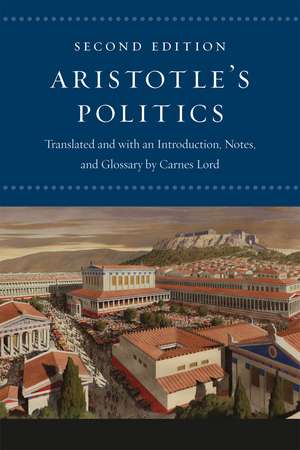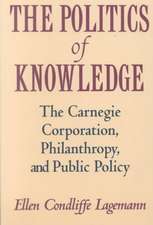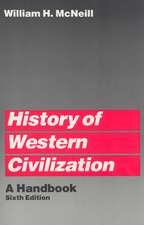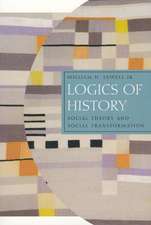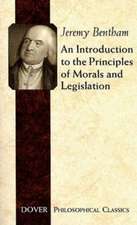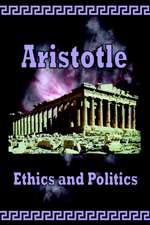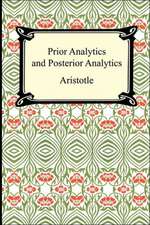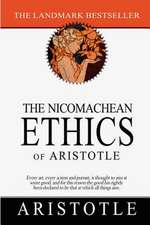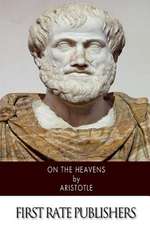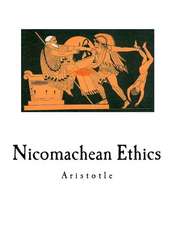Aristotle's "Politics": Second Edition
Autor Aristotle Traducere de Carnes Lorden Limba Engleză Paperback – 4 mar 2013
One of the fundamental works of Western political thought, Aristotle’s masterwork is the first systematic treatise on the science of politics. For almost three decades, Carnes Lord’s justly acclaimed translation has served as the standard English edition. Widely regarded as the most faithful to both the original Greek and Aristotle’s distinctive style, it is also written in clear, contemporary English.
This new edition of the Politics retains and adds to Lord’s already extensive notes, clarifying the flow of Aristotle’s argument and identifying literary and historical references. A glossary defines key terms in Aristotle’s philosophical-political vocabulary. Lord has made revisions to problematic passages throughout the translation in order to enhance both its accuracy and its readability. He has also substantially revised his introduction for the new edition, presenting an account of Aristotle’s life in relation to political events of his time; the character and history of his writings and of the Politics in particular; his overall conception of political science; and his impact on subsequent political thought from antiquity to the present. Further enhancing this new edition is an up-to-date selected bibliography.
Preț: 110.05 lei
Nou
Puncte Express: 165
Preț estimativ în valută:
21.06€ • 22.52$ • 17.56£
21.06€ • 22.52$ • 17.56£
Carte disponibilă
Livrare economică 27 martie-10 aprilie
Livrare express 12-18 martie pentru 26.56 lei
Preluare comenzi: 021 569.72.76
Specificații
ISBN-13: 9780226921846
ISBN-10: 0226921840
Pagini: 320
Ilustrații: 2 maps
Dimensiuni: 152 x 229 x 28 mm
Greutate: 0.43 kg
Ediția:Second Edition
Editura: University of Chicago Press
Colecția University of Chicago Press
ISBN-10: 0226921840
Pagini: 320
Ilustrații: 2 maps
Dimensiuni: 152 x 229 x 28 mm
Greutate: 0.43 kg
Ediția:Second Edition
Editura: University of Chicago Press
Colecția University of Chicago Press
Notă biografică
Carnes Lord is professor of strategic leadership at the Naval War College in Newport, Rhode Island. He is the author of Education and Culture in the Political Thought of Aristotle and The Modern Prince: What Leaders Need to Know Now, among other works.
Cuprins
Acknowledgments
Abbreviations of Aristotle’s Works
Abbreviations of Aristotle’s Works
Introduction: Aristotle’s Politics: Living Well and Living Together
I. Six Chapters to Living Well and Living Together
II. Book IV.1–2: The Four Kinds of Best and Aristotle’s Four Causes
III. Ethics and Politics
IV. What Can the Politics Tell Us About Politics?
1. Book I: Slavery and the Will to Power
I. Slavery: Incomplete Actions and Incomplete Souls
II. Slavery and Slavishness
III. Despotism
IV. Slavery, Despotism, and Human Nature
V. Natural Rulers, Political and Despotic
VI. Thumos: Domination and Friendship
VII. Aristotle’s Slavery and Contemporary Problems
2. Book II: Aristotle’s State as a Work of Art
I. The Ideal State and Its Problems
II. Property and a Unified Polis
III. Private Property, Ancient and Modern
IV. Property versus Education as a Unifying Force
V. The Modesty and Ambition of the Politics
VI. Politics as Practical, not Productive
VII. From the Preface to Politics to Politics Itself
3. The Justice of Book III and the Incompleteness of the Normative
I. Aristotle versus Liberalism: The Right and the Good
II. The Meaning of “Form” in Book III
III. The Definition of “Citizen”: Book III.1–3
IV. The Good Man and the Good Citizen: Book III.4–5
V. The Kinds of Constitutions: Book III.6–8
VI. Justice as Proportional to Merit: Book III.9–13
VII. The Rule of the Best versus the Rule of Law: Book III.14–18
VIII. Conclusion
4. Practical Knowledge and the Four Orientations to the Best 107
I. The Kinds of Constitutions: Book IV.3–10
II. Polity and the Best in General
III. The Best in Particular Circumstances: Book IV.12–13
IV. Formal Possibilities and the Best in Particular Circumstances: Book IV.14–16
V. Conclusion
5. Factions and the Paradox of Aristotelian Practical Science
I. Asymmetries, Epistemological and Ethical
II. Faction and Constitutional Change
III. Book V.1–4: Faction in General
IV. Book V.4: A Fifth Cause?
V. Book V.5–7: Faction and Particular Constitutions
VI. Book V.8–9: Preservation (and Improvement?)
VII. Preserving the Constitution and the Arts of Appearance
VIII. Stopping Factions versus Preserving the Constitution
IX. The Revolt of the Just
X. Political Philosophy: Inside or Outside the Polis?
XI. Philosophy and Phronēsis: Logos andĒthos
6. The Best Life and the Common Life
I. Book VII.1
II. Nature versus Justice
III. Book VII.2
IV. Book VII.3
V. Book VII.4–7
VI. Book VII.8
VII. Book VII.13
VIII. Book VIII: Virtue and Music
IX. The Ideal and the Practical
Conclusion: People as Political Animals
Notes
Works Cited
Index
I. Six Chapters to Living Well and Living Together
II. Book IV.1–2: The Four Kinds of Best and Aristotle’s Four Causes
III. Ethics and Politics
IV. What Can the Politics Tell Us About Politics?
1. Book I: Slavery and the Will to Power
I. Slavery: Incomplete Actions and Incomplete Souls
II. Slavery and Slavishness
III. Despotism
IV. Slavery, Despotism, and Human Nature
V. Natural Rulers, Political and Despotic
VI. Thumos: Domination and Friendship
VII. Aristotle’s Slavery and Contemporary Problems
2. Book II: Aristotle’s State as a Work of Art
I. The Ideal State and Its Problems
II. Property and a Unified Polis
III. Private Property, Ancient and Modern
IV. Property versus Education as a Unifying Force
V. The Modesty and Ambition of the Politics
VI. Politics as Practical, not Productive
VII. From the Preface to Politics to Politics Itself
3. The Justice of Book III and the Incompleteness of the Normative
I. Aristotle versus Liberalism: The Right and the Good
II. The Meaning of “Form” in Book III
III. The Definition of “Citizen”: Book III.1–3
IV. The Good Man and the Good Citizen: Book III.4–5
V. The Kinds of Constitutions: Book III.6–8
VI. Justice as Proportional to Merit: Book III.9–13
VII. The Rule of the Best versus the Rule of Law: Book III.14–18
VIII. Conclusion
4. Practical Knowledge and the Four Orientations to the Best 107
I. The Kinds of Constitutions: Book IV.3–10
II. Polity and the Best in General
III. The Best in Particular Circumstances: Book IV.12–13
IV. Formal Possibilities and the Best in Particular Circumstances: Book IV.14–16
V. Conclusion
5. Factions and the Paradox of Aristotelian Practical Science
I. Asymmetries, Epistemological and Ethical
II. Faction and Constitutional Change
III. Book V.1–4: Faction in General
IV. Book V.4: A Fifth Cause?
V. Book V.5–7: Faction and Particular Constitutions
VI. Book V.8–9: Preservation (and Improvement?)
VII. Preserving the Constitution and the Arts of Appearance
VIII. Stopping Factions versus Preserving the Constitution
IX. The Revolt of the Just
X. Political Philosophy: Inside or Outside the Polis?
XI. Philosophy and Phronēsis: Logos andĒthos
6. The Best Life and the Common Life
I. Book VII.1
II. Nature versus Justice
III. Book VII.2
IV. Book VII.3
V. Book VII.4–7
VI. Book VII.8
VII. Book VII.13
VIII. Book VIII: Virtue and Music
IX. The Ideal and the Practical
Conclusion: People as Political Animals
Notes
Works Cited
Index
Recenzii
“This revised edition of Aristotle’s 'Politics' easily establishes it as the best available in English. By offering a longer introductory essay that grapples with the substance of Aristotle’s argument, a new index, revamped notes, and—most important—by revising and correcting the text, Carnes Lord has substantially improved what was already a fine rendering of Aristotle’s classic account of political science. A great service to students and scholars alike.”
"This new edition of Lord's will continue to be a widely used translation of Aristotle's Politics."
Praise for the previous edition
“Lord’s translation is clearly the best available.”
“Lord contributed to raising scholarly interest in Aristotle with his groundbreaking translation. Now, nearly thirty years later, we are presented with a new edition. . . . The new format was chosen prudently. . . . The choice of footnotes will doubtless help students, scholars, and interested readers to solve the problems of textual analysis and interpretation more quickly and in the process of reading the text."
